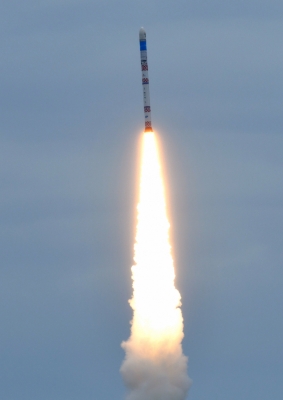By Venkatachari Jagannathan Sriharikota (AP) August 7.: The positioning of two satellites in an incorrect orbit and resulting in their total loss caused by the Indian Space Research Organization’s (ISRO) new rocket Small Satellite Launch Vehicle (SSLV) on Sunday has raised a number of concerns.
The estimated cost of the amount of Rs 56 crore SSLV rocket with the capacity of carrying satellites that weigh less than 500kg is designed to be used for commercial purposes as well as for strategic requirements, a space expert not wanting to be identified spoke to IANS.
The space mission’s failure on Sunday also puts the spotlight on the security of India’s space mission for humans which will be performed by Geosynchronous Satellite Launch Vehicle-Mk III (GSLV-Mk III) with the difficult cryogenic engine stage.
On the failure of the mission, ISRO Chairman S.Somanath stated: “SSLV-D1 placed the satellites into a 356 km x the 76 km elliptical orbit instead of 356 km circular orbit.The 76 km distance is the lowest point closest to the surface of the earth.”
He stated that when satellites are put in an orbit that is so favourable they won’t remain there for long and will be able to come down.”The two satellites have been removed from the orbit and are no longer useful,” Somanath said.
According to the ISRO, “failure of logic to recognize a sensor malfunction and then take action to repair it resulted in the deviation.A committee will analyse and make recommendations.In the event of the implementation of these recommendations, ISRO will come back in the near future with SSLV-D2”.
Somanath added the group of experts will study the cause of the failure and pinpoint the reason it went into an unacceptably orbit.After the minor corrections and validation of the adjustments, ISRO will go for the next SSLV launch shortly.
He also stated that the rocket’s three stages/engines as well as the other systems also performed well.
However, the expert asked: “If the rocket’s propulsion had been successful, it would have reached the required altitude, and the desired orbit would have been reached but is that not the case?”
The expert further explained that the sensor which failed came from industry and was used as a redundant sensor in ISRO’s other rockets, such as the Polar Satellite Launch Vehicle (PSLV).
“Didn’t ISRO do the necessary simulation studies, and what could have caused this to be missed? A defective sensor was the cause of the logic” The expert stated, however did not rule out the possibility of sabotage.
Another expert from the space sector who spoke under the basis of anonymity said to IANS: “The altitude is obtained in stages.Furthermore, when it is at the appropriate altitude, it must be able to reach the velocity required.At 356 km the rocket should be able to attain the sufficient velocity to create circular orbit, in the event of a failure, is an elliptical orbit.”
“If the sensor shuts off the rocket’s engines and the velocity will not be present and there won’t be a circular, but an elliptical orbit.Small satellites won’t have onboard thrusters , nor will they have them for any work of any significance,” the expert said.
They also suggested that ISRO should release information regarding the failure of the sensor, and the reasons for it to fail and if it was due to the quality of the component.
It’s time that ISRO is able to get its foundations right, which is its three rockets – PSLV, SSLV and Geosynchronous Satellite Launch Vehicle (GSLV)before looking at other exciting missions experts said.
“ISRO Chairman Somanath is advancing the space agency.In relation to the human space mission, he has also stated that further tests will be conducted to ensure the safety of the crew, and isn’t in an eagle to go on with the mission.” Dr Tapan Misra, a retired top official of ISRO and co-founder as Chief Technology Officer (CTO), Sisir Radar Private Ltd has told IANS.
(Venkatachari Jagannathan can be reached at [email protected])
vj/vd
.







